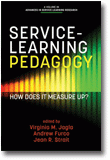
Service-Learning Pedagogy
How Does It Measure Up?
Edited by:
Virginia M. Jagla, National Louis University
Andrew Furco, University of Minnesota
Jean R. Strait, FACE and St. Paul Public Schools
A volume in the series: Advances in Service-Learning Research. Editor(s): Alan S. Tinkler, Missouri State University. Todd A. Price, National Louis University.
Published 2015
Service-learning is a powerful method of teaching and learning that has been used effectively for more than two decades. Its efficacy has been researched in a variety of ways and this volume continues to expand that research base. In particular, in this volume, Service-Learning Pedagogy: How Does It Measure Up?, we explore three broad areas of service-learning research and practice that reflect broader discussions of the role of pedagogy in today’s educational reform efforts: Teacher Education, Crossing Boundaries: Deepening Relationships in Service-Learning and New Paradigms/Conceptual Frameworks.
Many have called for more rigorous methods when researching service-learning pedagogy. That has been the major impetus for this volume. We seek to generate knowledge regarding service-learning pedagogy, while developing theories about it. We surface some elusive affective characteristics of the pedagogy, which we know has the power to produce transformational learning. To this end, the authors who have contributed to this volume effectively add to the growing body of knowledge in the field and help us get closer to understanding the extent to which service-learning does and does not measure up.
CONTENTS
Preface. Part I: Teacher Education, Jean R. Strait. Intersecting Lives and Identities: Shaping Service-Learning Spaces for Preservice Teachers to Experience and Learn About Diversity, Claire Desrochers. Examining the Process of Civic Learning through a Systematic Service-Learning Experience in Teacher Education, Margaret M. Ferrara and Marlene Rebori. A Heuristic Phenomenology on the Experience of Building a High School Service-Learning Program, Monica Kowal. Promises and Pitfalls of Service-Learning in Teacher Preparation: Lessons from Longitudinal Research, Kathleen C. Tice and Larry P. Nelson. Part II: Crossing Boundaries: Deepening Relationships in Service-Learning, Andrew Furco. Service-Learning Projects in College Introductory Statistics: Effects on Students’ Attitudes, Rachel Chaphalkar and Ke Wu. Community Engagement: Implementation and Success of Service-Learning Programs With Heritage and Foreign Language Students of Spanish, Gregory Thompson. Service-Learning Community: A Win for Students, Community, Institution, and Faculty, Mary Lo Re. Service-Learning Pedagogy: Understanding the Impact of Student Breadth and Depth of Engagement in Student Organizations, Julianne Gassman. Reflections on Service-Learning Situated in Challenging Contexts: Lessons Learned, Cynthia Bourne, Susan Crichton, and Deborah Carter. Community Partners Critique, Eric Hartman. Part III: New Paradigms/Conceptual Frameworks, Virginia M. Jagla. Twenty-First Century Literacies and Service-Learning: An Opportunity to Revolutionize Disciplinary Writing Instruction, George Boggs. Kaleidoscopic Learning: Spiritual and Social Conscience Development Through Narrative Reflection in Service-Learning, Matthew Maruggi. Across Boundaries of Privilege: Service-Learning for Social Justice, Deborah Rintels Weiner. Community-Engaged Learning and Supplemental Instruction: An Exploratory Study of Intersecting Pedagogies, Colleen Packer and Brenda Marsteller Kowalewski. Invited Retrospective: The Future of Service-Learning and Community Engagement Research is Mixed [Methods], Robert Shumer. About the Editors. About the Contributors.
-
Paperback9781623969554
Web price: $62.04 (Reg. 72.99)
-
Hardcover9781623969561
Web price: $89.24 (Reg. 104.99)
- eBook9781623969578

- EDU000000 - EDUCATION: General
- EDU029000 - EDUCATION: TEACHING METHODS & MATERIALS: General
- EDU037000 - EDUCATION: Research
-
 Educating Teachers and Tomorrow’s Students through Service-Learning Pedagogy
Educating Teachers and Tomorrow’s Students through Service-Learning Pedagogy
-
 Pursuit of Liberation
Critical Service-Learning as Capacity Building for Historicized, Humanizing, and Embodied Action
Pursuit of Liberation
Critical Service-Learning as Capacity Building for Historicized, Humanizing, and Embodied Action
-
 Service-Learning to Advance Access & Success
Bridging Institutional and Community Capacity
Service-Learning to Advance Access & Success
Bridging Institutional and Community Capacity
-
 Service‐Learning to Advance Social Justice in a Time of Radical Inequality
Service‐Learning to Advance Social Justice in a Time of Radical Inequality
-
 Taking eService-Learning to the Next Level
Models and Tools for Next Generation Implementation
Taking eService-Learning to the Next Level
Models and Tools for Next Generation Implementation
-
 Transforming Teacher Education through Service-Learning
Transforming Teacher Education through Service-Learning
-
 Understanding Service-Learning and Community Engagement
Crossing Boundaries through Research
Understanding Service-Learning and Community Engagement
Crossing Boundaries through Research

